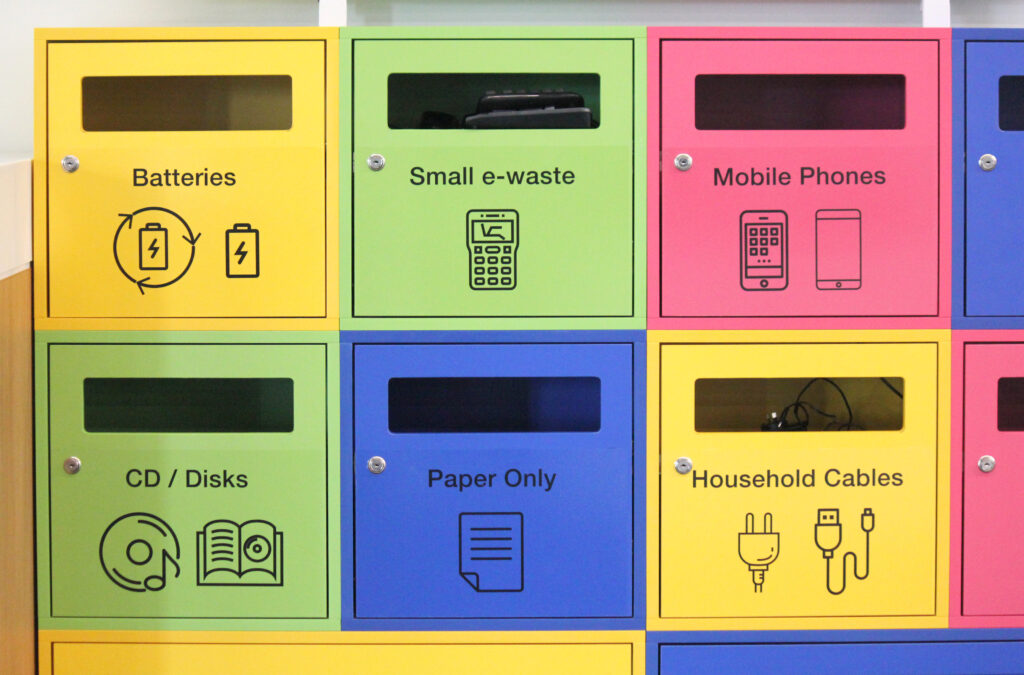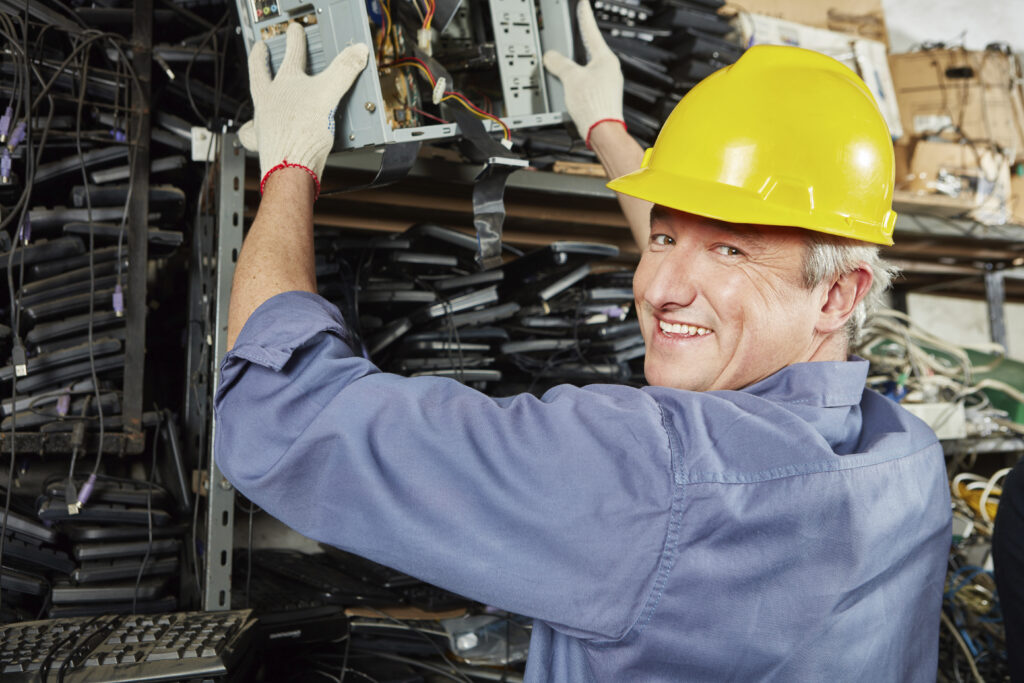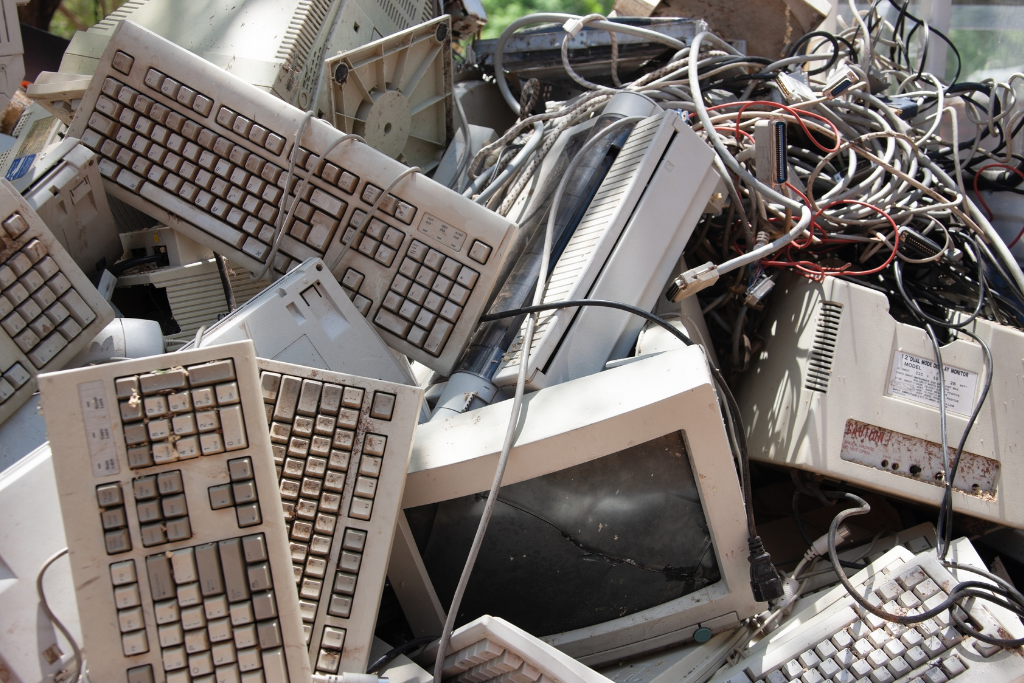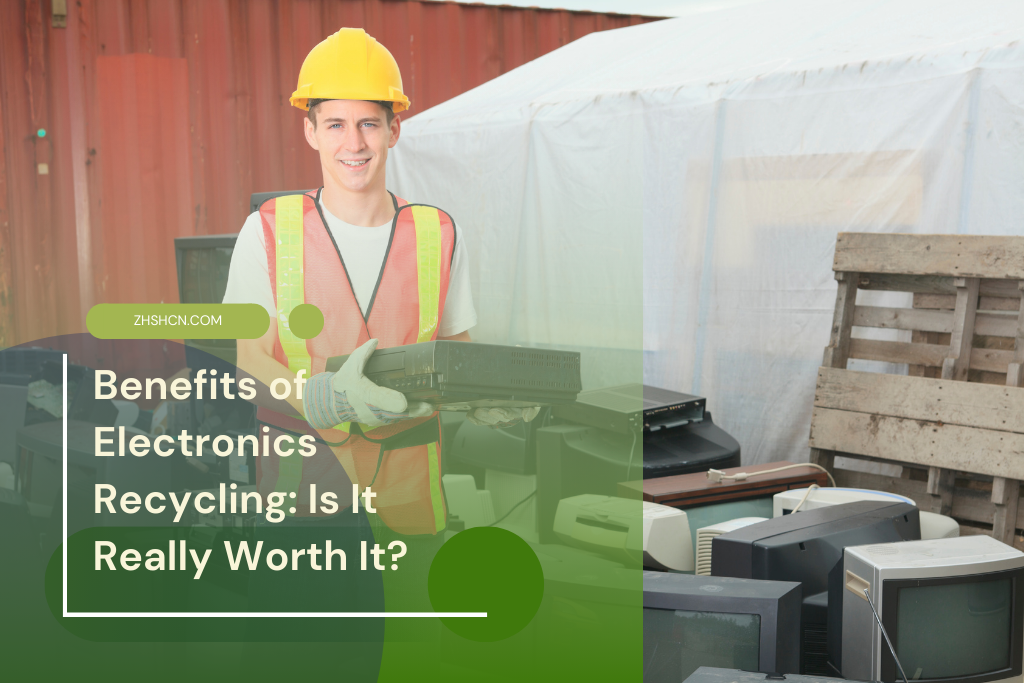As someone who has personally experienced the electronics recycling process, I can attest to its importance and positive impact on our environment. Electronics recycling is a vital practice that aims to responsibly dispose of and recycle electronic devices at the end of their lifecycle. It involves recycling materials like metals, plastics, and glass from these devices, reducing the strain on natural resources and preventing electronic waste from entering landfills. Electronics recycling typically includes collection, sorting, refurbishment, material recovery, and reselling or donating usable devices. The benefits of electronics recycling are significant.
It helps reduce pollution and greenhouse gas emissions by diverting electronic waste from landfills and incinerators. It contributes to the creation of jobs and stimulates the economy through the establishment of recycling facilities and the recovery of valuable materials. However, electronics recycling does come with its challenges. Lack of awareness and education about the importance of recycling and the complex nature of the recycling process are significant hurdles.
Supporting legislation and regulations promoting responsible recycling practices is essential to make electronics recycling more effective. Improving accessibility and convenience, such as providing more drop-off locations or implementing e-waste collection programs, can encourage individuals to recycle their electronic devices. Encouraging manufacturer responsibility by making them accountable for the sustainable disposal of their products can further enhance the effectiveness of electronics recycling.
Key Takeaways:
- Electronics recycling is worth it for the environment: Recycling electronics reduces pollution and greenhouse gas emissions, preventing harmful substances from entering landfills and contaminating soil and water.
- Electronics recycling has economic benefits: It creates jobs and stimulates the economy by supporting the refurbishment and resale of electronic devices, contributing to a more sustainable and circular economy.
- Improving accessibility and education is crucial: Raising awareness and providing convenient recycling options can encourage more people to participate in electronics recycling, ensuring its effectiveness in reducing e-waste and preserving natural resources.
My Personal Experience with Electronics Recycling
“`
I can attest to its benefits based on my experience with electronics recycling.
- Environmental Impact: Recycling prevents hazardous materials from polluting the environment.
- Conservation of Resources: It allows for the reuse of valuable materials, reducing the need for new resource extraction.
- E-Waste Prevention: Recycling ensures that electronic waste doesn’t end up in landfills, where it can release harmful toxins.
- Awareness: My experience with electronics recycling has made me realize the importance of spreading awareness about electronics recycling.
The Importance of Electronics Recycling
Electronics recycling is crucial due to its environmental impact, conservation of resources, and prevention of e-waste in landfills. The importance of electronics recycling cannot be overstated. To make it more effective, we should support legislation, improve accessibility, encourage manufacturer responsibility, and promote awareness and education. Let’s all contribute to a sustainable future by responsibly recycling our electronics.
What is Electronics Recycling?
What is Electronics Recycling?

Electronics recycling is the responsible process of collecting and disposing of electronic devices in an environmentally friendly manner. It involves the dismantling and reprocessing electronic components to extract valuable materials and minimize the environmental impact of e-waste. A significant milestone in the history of electronics recycling was the establishment of the Basel Convention in 1989. This convention was created to regulate the international transportation of hazardous waste, including electronic waste.
Benefits of Electronics Recycling: Why Should We Recycle Electronics?
Why should we bother with electronics recycling? Let me tell you, friend, there are plenty of great reasons! From reducing environmental impact to conserving precious resources, preventing e-waste from ending up in landfills, and even the potential for refurbishment and repair, reselling or donating, and material recovery. This section will open your eyes to the importance of recycling electronics and its benefits to our world. It’s time to make a difference and dive into the details!
Environmental Impact of Electronics
The environmental impact of electronics is substantial. Electronic waste, including hazardous materials such as lead, mercury, and cadmium, can contaminate soil, water, and air if disposed of incorrectly. By recycling electronics, we can diminish pollution and conserve valuable resources. Recycling electronic devices at designated drop-off locations or through manufacturer take-back programs is highly recommended to ensure proper disposal.
Conservation of Natural Resources
Recycling of electronics is of utmost importance in the conservation of natural resources. This is because it helps to reduce the need for extracting raw materials and mining minerals. Through the recycling of electronic devices, we can:
- Effectively reuse precious metals such as copper, gold, and silver, thereby minimizing the necessity of mining.
- Conserve energy that would otherwise be required to produce new electronic components.
- Preserve non-renewable resources like petroleum and minerals used to produce plastic and circuitry.
- Diminish the environmental impact associated with the extraction and processing of raw materials.
Benefits of Electronics Recycling: Preventing E-Waste from Entering Landfills
Protecting the environment and conserving resources is crucial, so preventing e-waste from entering landfills is important. To achieve this, consider taking the following steps:
- Educate yourself about the harmful effects of landfill disposal and the importance of electronic waste recycling.
- Locate local e-waste recycling programs or drop-off centers to dispose of your electronics properly.
- Extend the lifespan of working electronics by either donating or selling them.
- Make sure to participate in community e-waste collection events to guarantee responsible disposal.
- When purchasing electronics, practice responsible consumerism by selecting durable and repairable options.
Sorting
| Sorting |
| Process of categorizing electronic devices based on their type and condition. |
| Allows for efficient allocation of resources during refurbishment and material recovery. |
| Enables identification of reusable components and valuable materials for extraction. |
When I decided to recycle my old electronic devices, I was amazed at the meticulous sorting process at the recycling facility. Each device was carefully analyzed and sorted into categories, ensuring the valuable components and materials were properly utilized. Knowing that my old electronics were handled with attention to detail and environmental responsibility was reassuring.

Refurbishment and Repair
- Inspect the condition of the electronic device to determine if it can be refurbished and repaired.
- Identify any specific issues or malfunctions that need to be addressed.
- Replace any faulty components or parts with new ones.
- Conduct thorough testing to ensure that the repaired device is functioning properly.
- Clean the device to remove dust or debris and perform routine maintenance tasks.
- Ensure that the refurbished and repaired device meets the necessary quality standards.
Reselling and Donation
- Reselling and donating used electronics is an effective way to prolong their lifespan and reduce waste.
- By giving electronics to charitable organizations, individuals can contribute to the well-being of others through donations.
- Reselling and donating have environmental benefits, promote sustainability, support communities, and provide access to technology for those in need.
Fun fact: According to the Environmental Protection Agency, recycling 1 million laptops saves energy equivalent to the electricity used by more than 3,500 homes in a year.
Material Recovery
- Material Recovery is an essential and vital step in the electronics recycling process.
- During the process of Material Recovery, valuable materials such as gold, silver, and copper are efficiently extracted from electronic devices.
- These extracted materials can be reused to produce new electronics, reducing the mining dependency and conserving precious natural resources.
- Material Recovery also plays a significant role in preventing hazardous substances in electronics, like lead and mercury, from being disposed of in landfills, thus protecting and preserving the environment.
Is Electronics Recycling Worth It?
As we dive into electronics recycling, a question arises: Is it worth it? In the following sections, we’ll explore the compelling benefits of this practice. From reducing pollution and greenhouse gas emissions to creating jobs and stimulating the economy, there’s more to electronics recycling than meets the eye. So, let’s uncover why engaging in this endeavor can make a significant difference.
Benefits of Electronics Recycling
The Benefits of Electronics Recycling are numerous:
- One major benefit is that it reduces pollution and greenhouse gas emissions.
- Furthermore, it conserves natural resources.
- Additionally, it prevents e-waste from entering landfills.
- Moreover, it creates jobs and stimulates the economy.
Reducing Pollution and Greenhouse Gas Emissions
Reducing pollution and greenhouse gas emissions is a crucial aspect of electronics recycling. By properly disposing of electronic waste, we can:
- Prevent toxic substances like lead and mercury from seeping into the environment.
- Reduce the need for new electronic production, which requires significant energy and contributes to carbon emissions.
- Promote the recycling of valuable materials such as gold, silver, and copper from old electronics.
To make electronics recycling more effective in reducing pollution and greenhouse gas emissions, we should:
- Advocate for stricter regulations on e-waste disposal and enforce penalties for improper disposal.
- Establish more convenient drop-off locations and collection centers to encourage greater participation.
- Encourage electronics manufacturers to design products that are easier to recycle and use more sustainable materials.
Creating Jobs and Stimulating the Economy
Electronics recycling plays a crucial role in creating jobs and stimulating the economy. Here are a few ways it contributes:
- Through job creation: Recycling facilities require workers to sort, refurbish, and recover materials from electronic devices, creating employment opportunities.
- By promoting economic growth: The recycling industry not only helps reduce electronic waste but also generates revenue by selling refurbished electronics and recovered materials like precious metals, which boosts the economy.
- Supporting the supply chain: Recycling creates a demand for secondary raw materials, supporting businesses that collect and process electronic waste, thus contributing to the overall economic stability.
Fact: According to the U.S. EPA, recycling one million laptops can save energy, equivalent to powering over 3,500 homes annually.
Challenges in Electronics Recycling
Did you know that electronics recycling faces several challenges? In this section, we’ll uncover two key hurdles hindering recycling. A lack of awareness and education regarding the importance of recycling electronic devices. The complexities involved in the recycling process itself. Get ready to dive into the obstacles that electronics recycling must overcome to achieve sustainability and reduce environmental impact.
Lack of Awareness and Education
Lack of awareness and education is a significant issue in electronics recycling. Many of the population remains uninformed about the significance of recycling electronic devices or the correct disposal methods. It is of utmost importance to properly educate the public about the environmental consequences of e-waste and the appropriate techniques for recycling. A valuable tip would be promoting awareness through community workshops and online resources.
Complexities in the Recycling Process
The recycling process for electronics is characterized by many complexities, including the separation of different materials, the proper handling of hazardous substances, and the challenges associated with ensuring data security. Meeting these requirements necessitates specialized knowledge and resources, making electronics recycling an intricate task requiring meticulous planning and execution.
How Can We Make Electronics Recycling More Effective?
Looking to enhance the effectiveness of electronics recycling? Dive into the strategies that can revolutionize the process. Explore the power of supporting legislation and regulations, improving accessibility and convenience, and encouraging manufacturer responsibility. These game-changing sub-sections hold the key to a more sustainable future. So, gear up and join me as we unlock the potential of electronics recycling together.
Supporting Legislation and Regulations
Supportive legislation and regulations play a vital role in ensuring the effectiveness of electronics recycling. These measures are crucial as they guarantee the proper disposal of electronic waste, prevent the illegal export of such waste, and motivate manufacturers to take responsibility for their products. Enforcing regulations allows governments to incentivize recycling programs and hold businesses accountable for their electronic waste management practices. Ultimately, this will establish a more sustainable and efficient electronics recycling system.
Improving Accessibility and Convenience
To enhance the accessibility and convenience of electronics recycling, we can prioritize implementing additional drop-off locations, forge partnerships with retailers for collection purposes, and provide pickup services. By simplifying the process of recycling electronic devices, we can contribute to higher recycling rates and a reduced amount of e-waste generated. Interesting Fact: Were you aware that the recycling rate for e-waste in the United States is merely around 20%? (source: EPA)
Encouraging Manufacturer Responsibility
Encouraging manufacturer responsibility is of utmost importance in the field of electronics recycling. Companies must take ownership of their products by adopting sustainable design practices, utilizing eco-friendly materials, and offering convenient recycling options. By doing so, they contribute towards reducing e-waste and ensuring the proper disposal and recycling of electronic devices. This, in turn, leads to the development of a more sustainable and circular economy.
My Final Thoughts on Electronics Recycling
My Final Thoughts on Electronics Recycling: After considering the impact, benefits, and challenges, it is crucial to prioritize electronics recycling to protect the environment and conserve natural resources.
- Supporting legislation and regulations can help create a more effective recycling system.
- Improving accessibility and convenience will encourage more individuals to participate in recycling efforts.
- Encouraging manufacturer responsibility for proper disposal and recycling of electronic waste is essential.
History tells us that electronics recycling has been driven by increased awareness and technological advances. As we look to the future, we must continue prioritizing and improving electronics recycling practices for a sustainable and cleaner world.
Some Facts About Is Electronics Recycling Worth It?
- ✅ Electronics recycling helps recover valuable materials like gold, silver, and platinum from discarded devices. (Source: Sadoff E-Recycling and Data Destruction)
- ✅ On average, $4.22 worth of raw materials can be recovered from every one million recycled cell phones. (Source: Sadoff E-Recycling and Data Destruction)
- ✅ Computers have a higher material value, with an average of $26.92 worth of materials in each device. (Source: Sadoff E-Recycling and Data Destruction)
- ✅ Laptops contain about half the materials of desktop computers, making them worth approximately $13.46 per device. (Source: Sadoff E-Recycling and Data Destruction)
- ✅ Despite the potential value, e-recycling companies struggle to profit due to the complexity of separating materials and labor-intensive processes. (Source: Sadoff E-Recycling and Data Destruction)
Frequently Asked Questions
Is electronics recycling worth it?
Yes, electronics recycling is worth it due to several key reasons. Firstly, it helps reduce global pollution problems by preventing hazardous materials like lead, mercury, and arsenic from polluting the environment if not disposed of properly. Secondly, recycling electronic equipment allows for extracting and reusing valuable elements such as gold, silver, and platinum, reducing the need to extract raw materials from the earth. Lastly, recycling e-waste creates a greener environment by reducing electronic waste that ends up in landfills or is illegally exported to developing countries.
What are the economic factors impacting the profitability of electronics recycling?
Several market factors influence the profitability of electronics recycling. The volume of e-waste that needs to be recycled is important, as organizations processing a large amount of e-waste may find it more profitable. Additionally, the quality of the e-waste material is crucial since items with hazardous chemicals and difficult-to-process metals may not yield significant financial returns. Furthermore, the cost of recycling e-waste, including labor and equipment, can affect the overall profitability. It is essential to consider these factors when determining the economic viability of electronics recycling.
How do certified e-recycling companies contribute to ethical e-waste disposal practices?
Certified e-recycling companies play a vital role in promoting ethical e-waste disposal practices. They ensure that e-waste items are processed using environmentally sound methods, adhering to proper guidelines and regulations. These companies have specialized facilities and expertise to handle e-waste responsibly, minimizing the negative impact on the environment. Individuals and organizations can contribute to responsible e-waste disposal and support the recycling industry by choosing a trusted electronics recycler.

What are the stumbling blocks faced by e-recycling companies?
E-recycling companies face several challenges that can hinder their profitability. One significant stumbling block is the complexity of separating materials in electronic devices. E-waste must be broken down into various components, requiring labor-intensive disassembly, pre-processing, and sorting. Additionally, the high cost of labor and equipment, combined with the relatively small amounts of valuable materials in each device, make it difficult for e-recycling companies to generate significant profits. These challenges highlight the need for innovation and improvements in the e-recycling industry.
What is the cradle-to-grave mindset, and why is it important in electronics recycling?
The cradle-to-grave mindset is an approach that considers the entire lifecycle of a product, including its production, use, and disposal. It is crucial in electronics recycling as it emphasizes the need for responsible and sustainable electronic waste management. By adopting a cradle-to-grave mindset, individuals and organizations recognize the impact of their actions on the environment and strive to make environmentally responsible choices throughout the lifecycle of electronic products. This mindset encourages proper disposal, recycling, and reuse of unwanted electronics, ultimately contributing to a greener future.
How can individuals and businesses contribute to electronics recycling?
Individuals and businesses can contribute to electronics recycling in several ways. Firstly, they can ensure they dispose of unwanted electronics in an environmentally responsible manner by utilizing certified e-recycling companies or designated drop-off locations. Secondly, individuals can support electronics reuse by donating functional units whenever possible. Additionally, businesses can explore opportunities for refurbishing and reselling outdated electronics. By actively participating in electronics recycling, individuals and businesses fulfill their civic duty to protect the environment and help reduce the growing waste stream of electronic products.
